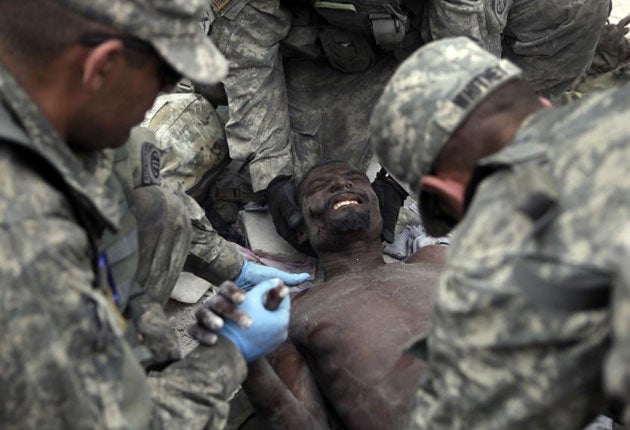Haiti's troubled children face the future
Traumatised orphans are now under threat from traffickers

Your support helps us to tell the story
From reproductive rights to climate change to Big Tech, The Independent is on the ground when the story is developing. Whether it's investigating the financials of Elon Musk's pro-Trump PAC or producing our latest documentary, 'The A Word', which shines a light on the American women fighting for reproductive rights, we know how important it is to parse out the facts from the messaging.
At such a critical moment in US history, we need reporters on the ground. Your donation allows us to keep sending journalists to speak to both sides of the story.
The Independent is trusted by Americans across the entire political spectrum. And unlike many other quality news outlets, we choose not to lock Americans out of our reporting and analysis with paywalls. We believe quality journalism should be available to everyone, paid for by those who can afford it.
Your support makes all the difference.The children cling to each other, lying in rows on the street, some crying softly in their sleep. Twenty yards away lie the ruins of their orphanage under which others – their brothers, sisters and friends – still lie buried.
Fifty-six died when the roof and the walls came tumbling down at Notre Dame de Nativite, among them the youngest victims, Cedric Francois and James Alcius, both five months old. For the 78 who lived, the future is full of foreboding, the present full of fearful memories.
There are thousands of children like these across Haiti, survivors scarred by memories which will remain long after the physical wounds heal.
Welfare workers said the risk of post-traumatic stress could not be higher. "The traumatised young have to sort out what they've been through," said Carolyn Miles, chief operating officer of Save the Children. "There's the shock, then there's the 'I just want to hang on to something,' then there's the anger."
Suzanne Young, a Detroit nurse specialising in child psychiatry, added: "The psychological factor is tremendously important. It needs to be addressed with the other problems these children face."
Among these problems are accounts emerging of the young being stolen and sold, some across the border into the Dominican Republic. A Canadian priest, Pastor Noel Asmonin, said he was offered a young boy for $50 at a refugee centre, and a man was lynched after being accused of trying to abduct a girl at another refugee camp.
Unicef's Nadine Perrault says that the situation represents "a huge, huge opportunity for the gangs. There's lots of evidence of the traffickers moving very fast, using all sorts of means".
But with officials struggling with the task of repairing the country's infrastructure, resources are stretched.
With little or no aid from the authorities, local people attempt to help. At Rue Douyon, outside the wreckage of Notre Dame, youths from the neighbourhood have organised 'patrols' to watch over the children at night. During the day women from surrounding homes come out to look after them.
"We are coping the best we can. What worries me is the psychological effect this will have on them. What they have been through has been very, very hard, and this is going to lead to long-term problems," said Eveline Louis Jacques, 61, head of the orphanage for eight years.
"Most of my children are very silent, they cry a lot, they are afraid of being left alone. They do not even have a shelter over their heads. You can see why they are very uncertain about everything."
Six year old Naiku Simon was hit on by a timber block and was trapped for eight hours. Touching the swollen bruise he recalled: "It was dark and I did not know what was happening. It hurt very much. I was crying and I could hear others were crying as well. It hurts, I miss people, I miss my mummy and daddy."
Paul Eustace, 11, escaped unhurt and helped to free others. "I do not know what happened to some of my friends, I have lost them, I think they are dead. I think about them a lot all the time."
Vanessa Line, three years old, was buried for two days. She has hardly spoken since. Reginald Gibbs, five, lies on a cot, his left leg in plaster. His three-year-old brother, Bernardier, was among the dead. "He is very silent as well," said Ms Louise Jacques. "He sometimes talks about his brother, that is all."
"Orphans" is a loose term; some were taken to Notre Dame by parents who could no longer look after them. Reginald's father Daniel and mother Sonia sat by his cot, their house also destroyed.
Mrs Gibbs cried quietly. "She is thinking about our other son," said her husband. The couple, however, still want Reginald to be adopted and have met the adoptive parents, a French couple.
"What can we do? We have six other children, and I do not have a job. If things were different then we could keep him," said Mr Gibbs. As he spoke, his shoulders shrank into a hopeless shrug.
Join our commenting forum
Join thought-provoking conversations, follow other Independent readers and see their replies
Comments